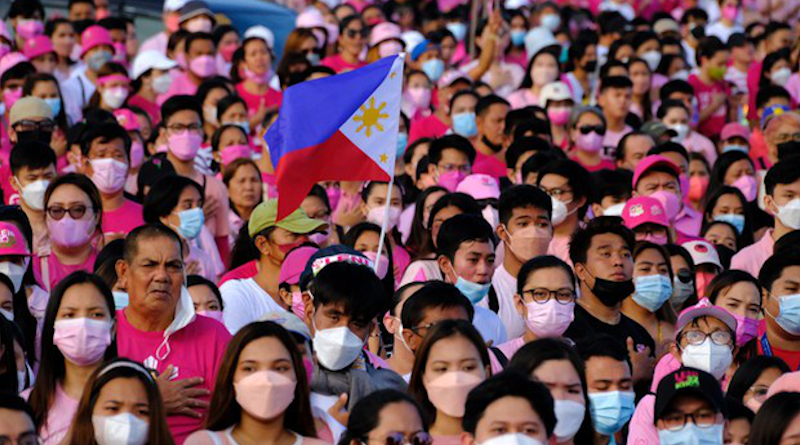Trolls, Online Disinformation Campaigns Cloud Philippine Presidential Election – Analysis
By BenarNews
By Aie Balagtas See*
With less than four weeks left until Filipinos vote for a new president, internet trolls are wreaking havoc by disseminating false information in the run-up to the general election, digital media and sociology analysts say.
The spread of disinformation online, they allege, is more than the mere handiwork of small-time keyboard warriors. Unscrupulous political operators are heavily financing it, according to the experts.
“It’s an open secret who these people are, these political strategists operate in board rooms, and they hold corporate accounts and political clients, and they still enjoy a very strong level of protection even from political elites,” said Jonathan Ong, an associate professor of digital media at the University of Massachusetts who has studied the phenomenon.
He did not name names but said there was a need to “reimagine our accountability measures” about a month before 65.7 million Filipinos are expected to cast ballots on May 9.
During a seminar organized by digital rights advocate EngageMedia on Saturday, Ong said interventions were focused on fact checking, information dissemination and media literacy.
While it may seem that efforts have been made to go after operators of fake social media accounts to unmask the people behind them, “we have done very little to hold accountable” the big wigs behind it, he said.
“That’s why even progressive legislators are hesitant to target these players and still go after small players or anonymous accounts,” Ong said.
These operators, he said, are driven not only by politics but money.
So much polarization has occurred ahead of the election that most presidential candidates seem to have their own pundits and influencers using mostly gutter language to spread information, Ong said.
‘Malicious fabrication’
He gave examples of how supporters of Vice President Leni Robredo and Ferdinand Marcos Jr. are running their presidential campaigns online. Supporters of both camps have been involved in meme wars and take-down wars against their opponents, among other online activities.
Ong said Robredo has suffered from the worst attacks. Propaganda operators have included nasty, misogynistic attacks on Robredo’s eldest daughter by including her name on pornographic sites.
On Monday, Robredo spokesman Barry Gutierrez condemned an alleged sex video targeting one of the candidate’s three daughters circulating online.
While it was difficult to pinpoint the person responsible for the smear, the false sex video spread among accounts supporting the campaign of her rival, Marcos Jr., the son and namesake of the late dictator who was ousted by a people power revolt in 1986.
“This is a malicious fabrication and we have reported it to the platforms so it is taken down,” Gutierrez said in a statement. “Our lawyers are studying our options for legal action.”
He said that the attack should be seen as nothing more than a “distraction” as Robredo’s campaign has gathered momentum over the past few weeks. On Saturday, more than 200,000 people flocked to her outdoor campaign rally in San Fernando city, north of Manila, according to local organizers.
“This is a direct vile response to the momentum we continue to gain. It won’t yield votes for those spreading it,” he said. “The goal of this tactic is to goad us to express anger on social media so that we turn people off from supporting us.”
The Robredo camp has been advised to be “firm but kind” in correcting online information regardless of how shameless that information can be, he said.
Pandemic
Meanwhile, political analyst Ramon Casiple said fewer people have been going out to hold or join public rallies because of the COVID-19 pandemic and are turning to social media to spread information.
Like Ong, Casiple said the spread of online propaganda is nothing new.
What makes this election distinct, according to Casiple, is the deliberate targeting of young people and feeding them fake or misleading information, especially about the martial law-era under the rule by Marcos’ father.
Casiple said this could be the reason for Marcos’ high ratings in the surveys, which showed that most people supporting him came from the younger demographics.
“This is bad because [the young generation] has not experienced politics that much,” Casiple said.
And according to Nicole Curato, a professor of sociology in the University of Canberra, challenging disinformation goes beyond waging war against fake news.
“How do you make chief instigators accountable,” she asked. “It’s about money politics.”
“When it comes to disinformation and elections, I think, we still don’t know enough about how to appreciate the extent to which fake news is a problem,” she said in the same forum as Ong. “We still need to ask whether disinformation offers a greater threat than long-standing issues of vote buying, electoral fraud, political dynasties, disenfranchisement and violence.”
Red Tani, the communications director of EngageMedia, which advocates digital rights in Southeast Asia, said separate studies by Curato and Ong confirmed “previous revelations about marketing firms leading politically motivated disinformation campaigns.”
EngageMedia notes that such practices threaten democracy and human rights, issues for which “we need to raise awareness, encourage action and demand accountability,” Tani said.
Last week, Facebook announced on its website that it had removed more than “400 accounts, Pages, and groups in the Philippines that worked together to systematically violate our Community Standards and evade enforcement.”
The announcement was included in a posting explaining how Facebook will activate an elections operation center while tackling hate speech and harmful content. It also discussed efforts to disrupt harmful networks and combat misinformation.
In January, Twitter suspended more than 300 accounts linked to the Marcos campaign.

